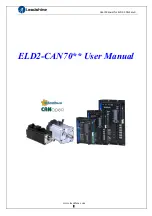
Chapter 6 Control Mode of Operation
ASDA-A2R Series
6-36
Revision December, 2014
6.5.1 Speed
/
Position Dual Mode
There are PT-S and PR-S in speed/position dual mode. The command source of the
former one comes from external pulse while the latter one comes from internal
parameters (P6-00~P7-27). Speed command could be issued by external analog voltage
or internal parameters (P1-09~P1-11). The switch of speed/position mode is controlled by
S-P signal and the switch of PR-S mode is controlled by DI signal, which is more
complicated. The timing diagram is shown as below.
In speed mode (S-P is ON), the speed command is selected via SPD0 and SPD1. CTRG
is not working at the moment. When switching to position mode (S-P is OFF), since
position command has not been issued (needs to wait the rising edge of CTRG), the
motor stops. The position command is determined by POS0~POS5 and triggered by
rising edge of CTRG. When S-P is ON, it goes back to speed mode again. Please refer to
the introduction of single mode for DI signal and the selected command of each mode.
6.5.2 Speed
/
Torque (force) Dual Mode
S-T is the only mode. The speed command comes from the external analog voltage and
internal parameters (P1-09 ~P1-11), which is selected via SPD0~SPD1. Similarly, the
source of torque (force) command could be external analog voltage and internal
parameters (P1-12
~
P1-14) and is selected via TCM0~TCM1. The switch of
speed/torque (force) mode is controlled by S-T signal. The timing diagram is shown as
below.
In torque (force) mode (S-T is ON), the torque (force) command is selected via TCM0
and TCM1. When switching to speed mode (S-T is OFF), the torque (force) command is
selected via SPD0 and SPD1. The motor operates according to the speed command.
Diagram 1: Dual control mode of speed and position
Diagram 2: Dual control mode of speed and torque
















































